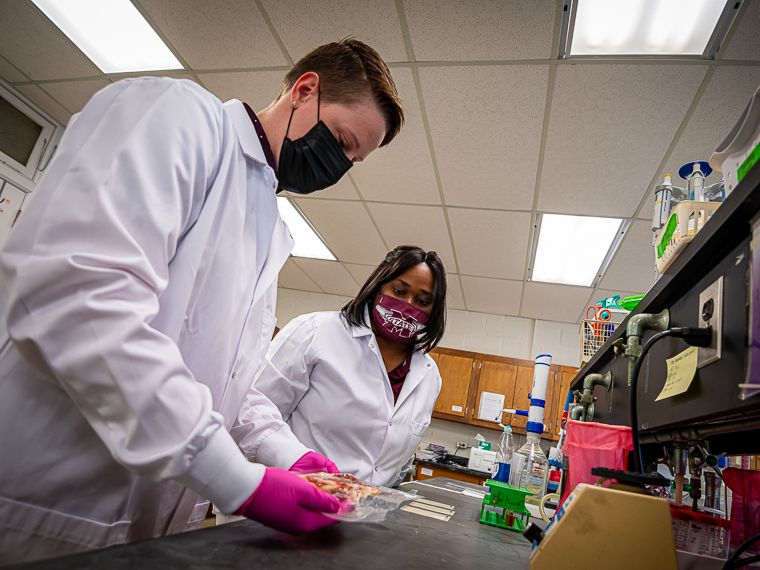The information presented on this page may be dated. It may refer to situations which have changed or people who are no longer affiliated with the university. It is archived as part of Mississippi State University's history.
AS CONSUMER DEMAND for fresh products increase, many opt for fresh-sliced, ready-to-eat meats from the deli counter as opposed to packaged meats. In addition to perceived freshness, the variety in selections, thickness of cut, and quantity also appeal to consumers.
While deli meats are appealing to a vast array of consumers, pre-packaged meats have a longer shelf life, due to packaging and preservatives. That is the reason Jessa Goodeaux, a senior food science, nutrition and health promotion major from Lonsdale, Arkansas, took on the task of looking at natural ingredients to extend the shelf life of deli meats.
As an undergraduate research scholar, Goodeaux is intrigued by chemistry, and particularly the chemistry in food that contributes to food safety. She is also an ROTC cadet and hopes to serve the Army National Guard in the Chemical Corps. Under the direction of Dr. Shecoya White, assistant professor in Food Science, Nutrition and Health Promotion, Goodeaux researched the effects of natural ingredients on the shelf life of ready-to-eat deli chicken.
"Ready-to-eat meats are particularly a concern since they may be consumed without further cooking or processing and are known to be highly susceptible to the growth of pathogenic microorganisms," Goodeaux explained.
Goodeaux conducted two different experiments to test a natural polysaccharide and citrus essential oil on extending the shelf life of ready-to-eat deli chicken. Polysaccharide is known to reduce bacteria, while essential oil is commonly used as a microbial agent. Citrus compounds are known for containing abundant amounts of polyphenols, which have been proven to possess antimicrobial activity.
"Substances derived from citrus fruits alone or combined with other natural antimicrobials have proven to inhibit growth of foodborne bacteria," Goodeaux said.
In part one of the study, Goodeaux experimented with the effectiveness of a citrus-based oil and antimicrobial polysaccharide solution to determine the rate of spoilage in ready-to-eat deli chicken meat held at room temperature for five days. The experiment included a control group with no additive, samples with an added polysaccharide, and samples with orange essential oil and polysaccharide. Bacterial colonies were counted and recorded on the first, third, and fifth days.
"The samples with the orange oil and polysaccharide solution had lower bacterial counts on day one and day three than the control but had a pungent odor," Goodeaux said. "By day five, the bacterial counts on the treatments were higher than the control, primarily because you are adding another food source for the bacteria to feed on."
Goodeaux went on to explain that the results were as expected in this accelerated shelf life study as the samples were kept at room temperature.
For part two of the study, Goodeaux treated samples with one or three percent orange oil, one or three percent orange oil with polysaccharide, or polysaccharide alone. Samples were marinated for two minutes and then individually packaged and refrigerated.
This study found the best results for reduced microbial activity occurred on the samples marinated with three percent orange oil and polysaccharide solution.
"The inhibition of growth of bacteria in meat treated with marinades containing orange oil and polysaccharide was dependent on the concentration of the citrus oil," Goodeaux said. "At the conclusion of the study, treatments containing three percent orange oil and polysaccharide showed, on average, less bacterial growth than control samples, or those not treated at all."
Clearly, the study found that the combination of orange essential oil and polysaccharide inhibited growth of bacteria in the study. Future research would evaluate varying levels of orange oil and polysaccharide and potentially include a taste test.
"We didn't analyze how, or if, the marinades altered the taste, so that would be a factor, when considering an additive to ensure a longer shelf life for ready-to-eat meats," Goodeaux said.
While there is more research to be done, the study shows promise for a natural additive to extend the shelf life of ready-to-eat meats, which currently should be consumed within five days of purchase.
The research addresses several key factors: consumer push towards replacement of synthetic chemicals to natural preservatives, increased food quality through shelf life extension, and the potential to inhibit the growth of foodborne pathogens, according to Dr. Shecoya White.
White added, "We are excited about the trajectory of this research which focuses on consumer health and wellbeing through ensuring that the food supply and food system is of the utmost quality and safety," White said.
As for Goodeaux, participating in the Undergraduate Research Scholars Program cemented her decision to continue in a career that emphasizes food safety. She will be interning this summer with a beverage company to improve their food safety certification.
This research was funded by the Mississippi Agricultural and Forestry Experiment Station's Special Research Initiative and the Undergraduate Research Scholars Program.

